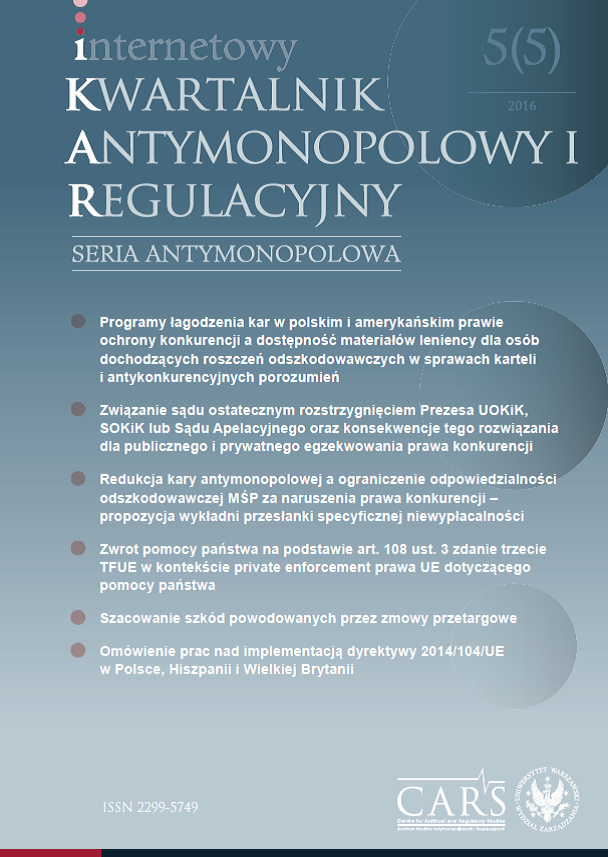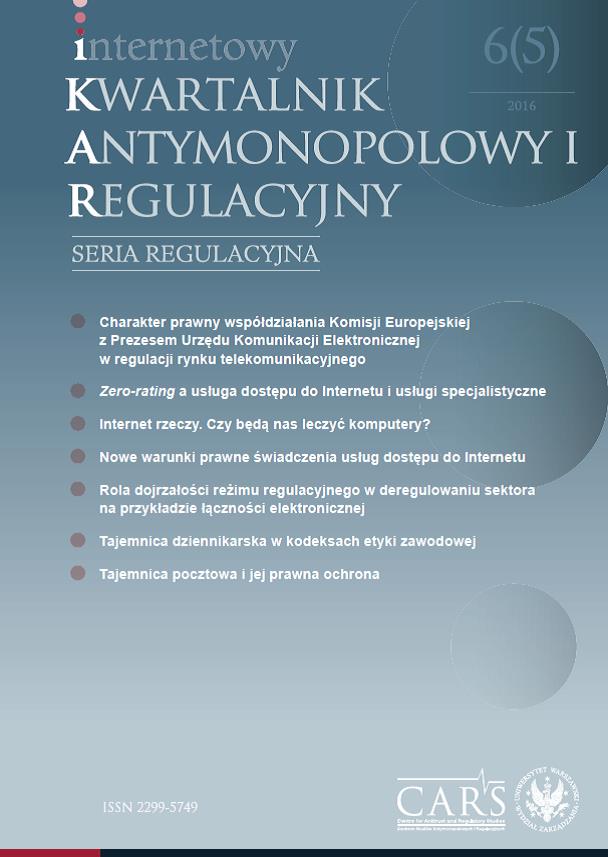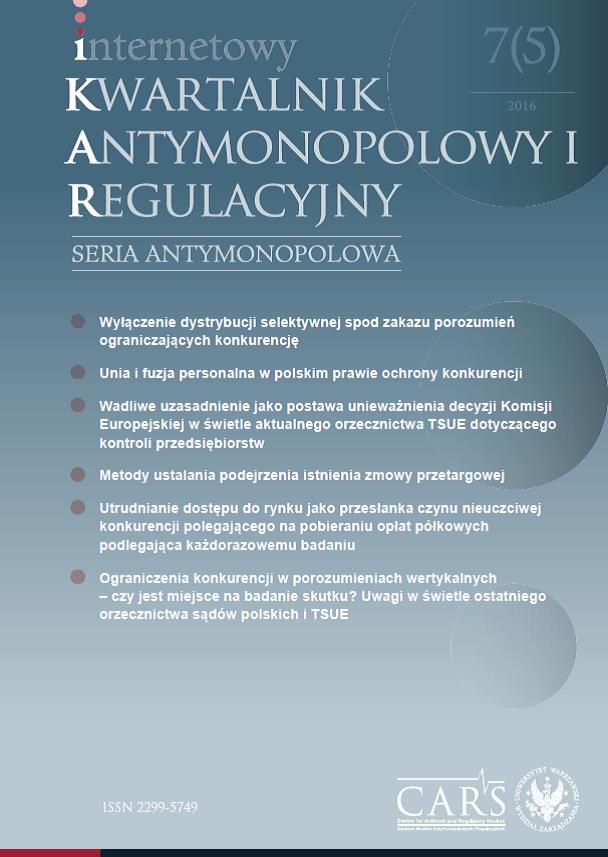
We kindly inform you that, as long as the subject affiliation of our 300.000+ articles is in progress, you might get unsufficient or no results on your third level or second level search. In this case, please broaden your search criteria.



The article addresses issues concerning access to leniency materials by private damages action litigants in cases of restrictive agreements, and analyzes relevant legal provisions in Polish and US laws. With regard to the former, the article considers both its current rules as well as a draft act which will serve to implement the EU Damages Directive (Directive 2014/104/EU). The issue of disclosure of leniency materials to private damages action litigants is analyzed from the perspective of its impact on the effectiveness of leniency programmes. This article questions whether the upcoming legislation concerning access to leniency materials may lessen the readiness of undertakings to submit leniency applications. A consequence of a dampening of the interest in seeking leniency would be a decrease in the effectiveness of public enforcement of competition rules. The authors make therefore certain proposals de lege ferenda. At the same time, a comparison of relevant Polish and US provisions and practices leads the authors to the conclusion that it is the US and its judicial decisions that design the relationships between public and private competition enforcement so that each of these instruments interacts with each other without lowering the other’s effectiveness.
More...
This article analyses the issues linked to the binding effect of national competition authorities’ and appeal courts’ final decisions on civil courts, introduced by Directive 2014/104/EU of the European Parliament and of the Council of 26 November 2014 on certain rules governing actions for damages under national law for infringements of the competition law provisions of the Member States and of the European Union (the Directive), which requires implementation into the Polish legal system. Although in principle the adoption of this solution should contribute to an increase in the effectiveness of private competition law enforcement, its shape and scope might be problematic to a certain extent. Therefore, in this article the authors consider the scope of the binding force of the President of the OCCP’s final decisions and analyse in detail the impact of the nature of joint participation in civil proceedings in competition law cases on the possibility and effectiveness of private competition law enforcement, in particular in terms of legal certainty. In addition, the authors indicate substantial risks which may arise in this context. These considerations expressly demonstrate the existence of a conflict between several general rules underlying the Directive. The article concludes with the de lege ferenda proposals regarding the Polish provisions which would implement the Directive
More...
Directive 2014/104/EU provides for a limitation of the liability of SMEs in cases where the application of its normal rules on joint and several liability would irretrievably jeopardise their economic viability and cause their assets to lose all their value. The meaning of this provision is everything but clear and commentators have voiced unanimous and harsh criticism of the chosen wording. This article presents a proposal for the interpretation of this provision based on its observed parallel with the requirements for a reduction of the fine imposed by the European Commission in antitrust cases
More...
This paper constitutes an attempt at suggesting practical means of enforcement of Article 108(3) third sentence TFEU under Polish law. The author undertakes to analyse the norm of EU law and seeks a procedural basis of its enforcement under Polish law (as a law of an EU Member State). The goal is to verify whether there are any means to secure effectiveness for Article 108(3) third sentence TFEU under Polish law. The paper takes account of the jurisprudence of the CJEU as well as that of Polish courts
More...
The article discusses the various stages and methods of estimating damages caused by bidrigging. Emphasized first is the importance and essence of constructing a counterfactual scenario describing what would have happened in the absence of bid-rigging. Discussed next are the technical and practical aspects of the use of the various damage-estimation methods. They include: comparator-based methods, financial-analysis-based methods, and market-structure-based methods. The description of each method is accompanied by examples of their use. Finally, the article analyses the practical considerations related to the choice of a given method (among the range of various methods available) in the context of the availability of the relevant data and credibility of the underlying assumptions.
More...
Collective rights management organizations (which manage copyright as well as related/neighboring rights) operating without an approved tables of copyright royalties, are entitled to license, or to terminate an existing license agreement, only for an important reasons. The dispute over a mere royalty rate, without the presence of any other disputable issue, cannot be considered as an important reason under Article 106(2) of the Act on Copyright and Related Rights, justifying the termination of a license agreement for the repertoire of such organization, or a refusal to enter into such contract at all. The shape of the collective management system in Poland makes each organization a monopolist within the scope of its activity (within its own repertoire). Even if a particular repertoire is represented by more than one organization, the nature of the user’s business activity, and the specifics of using the protected content, makes it necessary for the legal user to sign a license contract with all relevant organizations at the same time, which in turn makes product substitutability virtually nonexistent. Refusal to license made under Article 106(2) of the Act on Copyright and Related Rights may constitute the sole and independent ground for establishing an abuse by a collective rights management organization. Provided that conditions of the above Act are fulfilled i.e. the refusal is made for an important reasons, a separate economic scrutiny of the adequacy of royalty fees in terms of article 9(1(1)) of the Act on the Protection of Competition and Consumers may be redundant
More...





The aim of the paper is to review the legal nature of the consultation procedure between European Commission (EC) and the President of the Office of Electronic Communications (UKE). In the procedure, EC analyses a draft of the regulatory measures notified by UKE and has right to issue a recommendation. Moreover, the author discusses a problem of the judicial control of the decision issued by UKE as a result of the consultation with EC. According to the author, only the national courts (SOKiK) are legitimate to control the decision.
More...
The article discusses the Internet of Things (IoT) applications in medicine. The advantages of using electronic medical records are described. The possibilities of mobile applications and peripheral devices related to health and physical activity utilization are presented. The opportunities and threats that may arise from computerization of health care are discussed
More...
Zero-rating is the practice of offering unlimited access to certain internet content to data plan subscribers in mobile communication networks. It is pertinent to the concept of network neutrality. The article explains the various types of zero-rating and presents their positive and negative consequences. The positives relate most of all to a beneficial influence on the competition between providers of internet access services. The negatives consist in a detrimental influence on the development of innovative internet content. Zero-rating is considered a threat to network neutrality even in developing countries, even though it is there that social development might benefit the most from it. The article includes an analysis and legal interpretation of the provisions of the open internet regulation, leading to the conclusion that zero-rating is not allowed in the EU in internet access service offers. It may also not be considered a type of a specialised service
More...



The article studies the application of block exemptions and individual exemption to selective distribution systems. The author examines the conditions of applying Polish and European general block exemption and the possibility of combining selective distribution with common additional restrictions. Also, the article describes the methodology used by the European courts to individually exempt selective distribution systems and examines the relation of the prerequisites of individual exemption and the Metro doctrine
More...